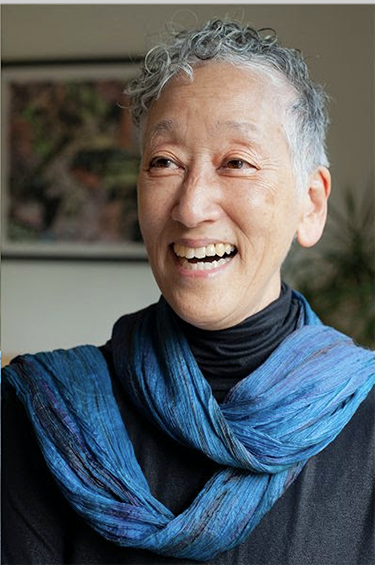Karen Tei Yamashita Receives 2021 Medal For Distinguished Contribution To American Letters

UC Santa Cruz emerita professor of literature Karen Tei Yamashita has received the 2021 Medal for Distinguished Contribution to American Letters from The National Book Foundation (NBF), presenter of the National Book Awards. She is the 34th recipient of this lifetime achievement award, which in the past has been given to Maxine Hong Kingston, Toni Morrison, Ursula K. LeGuin, and Walter Moseley.
Appearing on camera wearing the large brass medal given to winners each year, Yamashita said she was, “stunned to be here,” and thanked NBF Executive Director Ruth Dickey and Board Chair David Steinberger for this “gracious and profound honor.” She also singled out her longtime publisher Coffee House Press and her “colleagues, students, and staff at UC Santa Cruz who have provided me with a home to research and write.”
“I thank all of you who have gifted me with this amazing journey,” she said, during the Nov. 17 online ceremony. “I have been truly blessed.”
Yamashita used her acceptance speech, in part, to emphasize the significance of this medal being awarded to an Asian-American writer “especially this year, post-pandemic, having weathered the Twitter absurdity, corruption, and mendacity; the brutality of racial profiling; and the provocation of anti-immigrant, anti-refugee, anti-Muslim, [and] anti-Asian hatred.”
“In such times,” she continued, “may our writing forge tolerance and care.”
Through much of her acceptance speech, Yamashita reflected and offered thanks to the people who helped support her journey as a writer. She pointed to two beloved aunts who recognized her talent with words and brought her to meet Yoshiko Uchida, a family friend and Japanese-American who had written several books on her experiences growing up amid the anti-Asian hatred of World War II. This opened Yamashita up to the work of many other Asian-American writers of Uchida’s generation, including John Okada, Jeanne Wakatsuki Houston, and Wakako Yamauchi.
Yamashita reserved her strongest statements for the end of her speech, using the Japanese folk tale of Urashima Taro as a metaphor for the experience of being a writer and of being alive.
In that story, Taro rescues a turtle from a group of children and is rewarded by being carried by the creature to an underwater kingdom. While he lives in luxury in this palace, he misses home and decides to return. Before he leaves, the princess of this kingdom gifts him with a jewel box, instructing Taro to never open it lest he be forced to face the consequences within. Upon returning, he realizes 100 years have passed. Unable to contain his curiosity, he opens the gifted box and immediately turns into the old man he should be.
Yamashita unpacked the layers of meaning within this story during her acceptance speech. The turtle, she said, could be the vehicle for our life’s journey or “with its shell as home has a different lesson. How we must travel within our bodies, even if marked by ethnicity, gender, color. Immigrants, refugees, exiles, by the fortunes of life, have set forth on the backs of immortal turtles to distant places… to discover that return is impossible.”
Too, the jewel box, in Yamashita’s mind, becomes a potent symbol for the creative process, daring her fellow writers to open it up and reap the consequences.
“We discover,” she said, “that writing what we think, turning ideas on the page, can reconstruct ways of thinking. Ideas are dangerous and transformative. Writing them is creative work for which we are responsible, accountable. Writing requires our constant care and integrity.”
This award from the National Book Foundation is just the latest accolade for Yamashita. The author of 10 books, she has received numerous honors during her career. Her 2011 novel I Hotel was a finalist for the National Book Award, and in 2009, she received a John Dos Passos Prize for Literature.
Original Link: https://news.ucsc.edu/2021/12/yamashita-medal.html.
